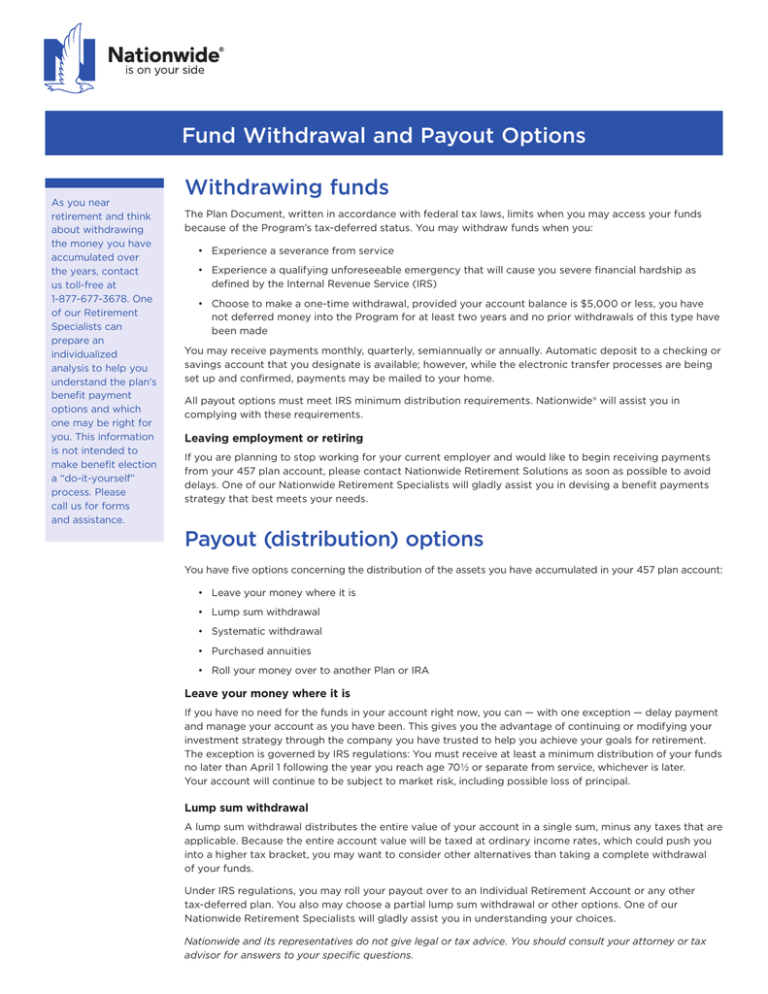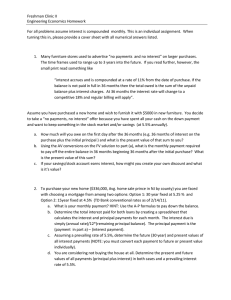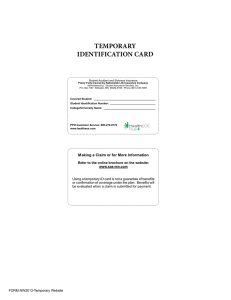options Fund Withdrawal and Payout Options
advertisement

Fund Withdrawal and Payout Options As you near retirement and think about withdrawing the money you have accumulated over the years, contact us toll-free at 1-877-677-3678. One of our Retirement Specialists can prepare an individualized analysis to help you understand the plan’s benefit payment options and which one may be right for you. This information is not intended to make benefit election a “do-it-yourself” process. Please call us for forms and assistance. Withdrawing funds The Plan Document, written in accordance with federal tax laws, limits when you may access your funds because of the Program’s tax-deferred status. You may withdraw funds when you: • Experience a severance from service • Experience a qualifying unforeseeable emergency that will cause you severe financial hardship as defined by the Internal Revenue Service (IRS) • Choose to make a one-time withdrawal, provided your account balance is $5,000 or less, you have not deferred money into the Program for at least two years and no prior withdrawals of this type have been made You may receive payments monthly, quarterly, semiannually or annually. Automatic deposit to a checking or savings account that you designate is available; however, while the electronic transfer processes are being set up and confirmed, payments may be mailed to your home. All payout options must meet IRS minimum distribution requirements. Nationwide® will assist you in complying with these requirements. Leaving employment or retiring If you are planning to stop working for your current employer and would like to begin receiving payments from your 457 plan account, please contact Nationwide Retirement Solutions as soon as possible to avoid delays. One of our Nationwide Retirement Specialists will gladly assist you in devising a benefit payments strategy that best meets your needs. Payout (distribution) options You have five options concerning the distribution of the assets you have accumulated in your 457 plan account: • Leave your money where it is • Lump sum withdrawal • Systematic withdrawal • Purchased annuities • Roll your money over to another Plan or IRA Leave your money where it is If you have no need for the funds in your account right now, you can — with one exception — delay payment and manage your account as you have been. This gives you the advantage of continuing or modifying your investment strategy through the company you have trusted to help you achieve your goals for retirement. The exception is governed by IRS regulations: You must receive at least a minimum distribution of your funds no later than April 1 following the year you reach age 70½ or separate from service, whichever is later. Your account will continue to be subject to market risk, including possible loss of principal. Lump sum withdrawal A lump sum withdrawal distributes the entire value of your account in a single sum, minus any taxes that are applicable. Because the entire account value will be taxed at ordinary income rates, which could push you into a higher tax bracket, you may want to consider other alternatives than taking a complete withdrawal of your funds. Under IRS regulations, you may roll your payout over to an Individual Retirement Account or any other tax-deferred plan. You also may choose a partial lump sum withdrawal or other options. One of our Nationwide Retirement Specialists will gladly assist you in understanding your choices. Nationwide and its representatives do not give legal or tax advice. You should consult your attorney or tax advisor for answers to your specific questions. Systematic withdrawal Systematic withdrawal allows you to keep your funds invested as you withdraw specified amounts as distributions. If you choose this option, you will be subject to income tax only on the amounts you receive each year. Since your money will remain in your account, you can continue to manage your investments just like you have been. You will continue to receive current rates of return on assets remaining in the fixed return option. If you are invested in variable options, your account value will fluctuate based on the performance of the underlying investment options and your investments will potentially continue to earn tax-deferred growth. All current services — including exchange privileges and contract charges — will continue to apply. Two systematic withdrawal options are available 1. If receiving a regular payment for a specific amount and managing your own investments are top priority, the designated amount option may be best for you. With it, you decide how much you need per payment and that amount remains constant. You select and manage your accounts. How long your money lasts depends on how well your account investments perform. 2. If your primary concern is the number of years your money will last, the designated period option may be the better choice. You oversee your investments. The amount you receive is based on how well your investments perform and how long you want to receive your money. Your distribution amount will vary from payment to payment. Under IRS regulations, you must receive at least a minimum distribution of your funds no later than April 1 following the year you reach 70½ or separate from service, whichever is later. Of course, Nationwide Retirement Solutions will assist you in calculating the minimum distribution amount and complying with these requirements. Purchased annuities 1.Fixed designated period annuity An annuity is purchased that provides payments for a fixed period of time, between three and 20 years, depending on your age. The annuity purchase rates in effect when your payments begin determine your actual annuity payment. All annuity payments are guaranteed. 2.Life income with payments certain annuity An annuity is purchased providing lifetime payments guaranteed for a certain period (0, 5, 10, 15, 20, 25 or 30 years). If the participant dies before the end of the guaranteed period, payments will continue to the designated beneficiary until the end of the period selected. Purchased annuities may be subject to certain risks, restrictions, and limitations. Please consult your investment professional to determine if a purchased annuity is right for you. Annuities are issued by Nationwide Life Insurance Company, Columbus, OH. Guarantees are subject to the claims paying ability of the issuing insurance company. Roll over your money to another Plan or IRA If you leave your job for any reason, you may roll over eligible distributions from your Nationwide-administered 457 deferred compensation plan tax free to a 401(k) or other tax-qualified plan, 403(b) annuity or any other type of plan that accepts rollovers, or to an IRA. In addition, a surviving spouse will be able to roll over distributions from a deceased spouse’s plan to his/her own plan. Look to Nationwide for solutions At any time, you are welcome to discuss your plan’s distribution options with a Nationwide Retirement Specialist by calling toll-free 1-877-677-3678. Nationwide and its representatives do not give legal or tax advice. Please consult your tax or legal advisor for answers to your specific questions. Nationwide Retirement Solutions and Nationwide Life Insurance Company (collectively “Nationwide”) have endorsement relationships with the National Association of Counties and the International Association of Fire Fighters-Financial Corporation. More information about the endorsement relationships may be found online at www.nrsforu.com. Retirement Specialists are Registered Representatives of Nationwide Investment Services Corporation, member FINRA. Nationwide, the Nationwide N and Eagle and Nationwide is on your side are service marks of Nationwide Mutual Insurance Company. © 2015 Nationwide NRM-3083AO.6 (01/15)




